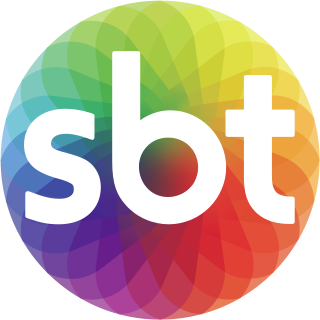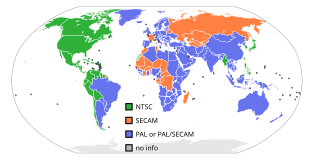
The Sistema Brasileiro de Televisão is a Brazilian television network founded on Wednesday, 19 August 1981, by the businessman and television personality Silvio Santos. The company was established after a public tender by the Brazilian Federal Government to form two new networks, created from revoked concessions of the defunct Tupi and Excelsior networks. The SBT was founded on the same day that the concession agreement was signed, and that the act was broadcast live by the network, so that this was his first program aired. Before acquiring the concessions of the four station that were to form the SBT, Grupo Silvio Santos had since 1976 the concession of Rio de Janeiro's channel 11, known as TVS Rio de Janeiro, which was a fundamental step to give life to the SBT.

TV Globo, formerly known as Rede Globo, is a Brazilian free-to-air television network, launched by media proprietor Roberto Marinho on 26 April 1965. It is owned by media conglomerate Grupo Globo. The TV station is by far the largest of its holdings. Globo is the largest commercial TV network in Latin America and the second-largest commercial TV network in the world behind the American Broadcasting Company and the largest producer of telenovelas. All of this makes Globo renowned as one of the most important television networks in the world and Grupo Globo as one of the largest media groups.
ISDB-T International, or SBTVD, short for Sistema Brasileiro de Televisão Digital, is a technical standard for digital television broadcast used in Brazil, Argentina, Peru, Botswana, Chile, Honduras, Venezuela, Ecuador, Costa Rica, Paraguay, Philippines, Bolivia, Nicaragua, El Salvador and Uruguay, based on the Japanese ISDB-T standard. ISDB-T International launched into commercial operation on 2 December 2007, in São Paulo, Brazil, as SBTVD.

RecordTV, formerly known as Rede Record, is a Brazilian free-to-air television network. It is currently the second largest commercial TV station in Brazil, and the 28th largest in the 2012 world ranking. In 2010, it was elected by the advertising market as the fifth largest station in the world in revenues and the eighth largest network in physical structure. In June 2021, it ranked second among the most watched channels in the country in the National Television Panel, behind only TV Globo.

Grupo Silvio Santos, is a Brazilian holding led by the Brazilian billionaire media-man Silvio Santos.
The Prêmio José Reis de Divulgação Científica is an annual honor awarded by the Brazilian Council of Scientific and Technological Development (CNPq) to the institution, media organization, publication, or individual who most contributed to the dissemination and public awareness of science and technology in Brazil. It is thus named in honor of Dr. José Reis, a Brazilian biologist and science writer who was one of the pioneers in the field.

PAL-M is the analogue colour TV system used in Brazil since early 1972, making it the first South American country to broadcast in colour.

Television in Brazil has grown significantly since the first broadcasts in 1950, becoming one of largest and most productive commercial television systems in the world. Its biggest network, TV Globo, is the second largest commercial network in South America, and is one of the largest television exporters around the world, particularly of telenovelas, having become popular in many countries. There are 14 free-to-air television networks, as well as satellite channels broadcasting throughout the country.

TV Verdes Mares is a television station licensed to Fortaleza, Ceará, Brazil, affiliated with TV Globo. Owned by Sistema Verdes Mares, subsidiary of Grupo Edson Queiroz, it is part of a duopoly with Fortaleza-licensed independent station TV Diário. TV Verdes Mares's studios and transmitter are located on Desembargador Moreira Avenue, in the Dionísio Torres district, on Fortaleza.
Agência Brasil (ABr.) is the national public news agency, run by the Brazilian government. The agency was founded in 1990 and it's part of the public media corporation Empresa Brasil de Comunicação (EBC), created in 2007 to unite two government media enterprises Radiobrás and TVE. It is publishing contents under CC-BY.
Izabella Spaggiari Brazil Camargo, best known as Izabella Camargo, is a Brazilian journalist.
Grupo Bloch, also known as Empresas Bloch, is a Brazilian media conglomerate, founded by Ukrainian businessman Adolpho Bloch's family after their arrival in Rio de Janeiro in 1922, when they created Joseph Bloch & Filhos company. The company, which published pamphlets and other printed material, also started to print magazines. Thus, in 1953, the company launched Manchete magazine. With its successful launch, the publishing division of Bloch Editores was established.

Leda Maria Linhares Nagle is a Brazilian journalist, writer, actress and television presenter. She hosted the program Sem Censura at TV Brasil for over 20 years.

Lírio Mário da Costa, better known as Costinha, was a Brazilian comedian and actor.

Cable News Network Brazil is a Brazilian news-based pay television channel. Launched on 15 March 2020, CNN Brazil is owned by Novus Media, a joint-venture between Douglas Tavolaro, former header of RecordTV's news division, and Rubens Menin, owner of MRV Engenharia. Novus Media has a licensing agreement with original CNN channel owned by Warner Bros. Discovery. CNN Brazil is the second local franchise of CNN in South America, after CNN Chile.

The TV dos Trabalhadores is a Brazilian television broadcaster founded in 2010 with headquarters and studios in the city of São Bernardo do Campo and a concession in the city of Mogi das Cruzes, both in the metropolitan region of São Paulo. It belongs to Fundação Sociedade Comunicação, Cultura e Trabalho, founded by Sindicato dos Metalúrgicos do ABC and Sindicato dos Bancários e Financiários de São Paulo, Osasco and Região that also maintains Rádio Brasil Atual.












